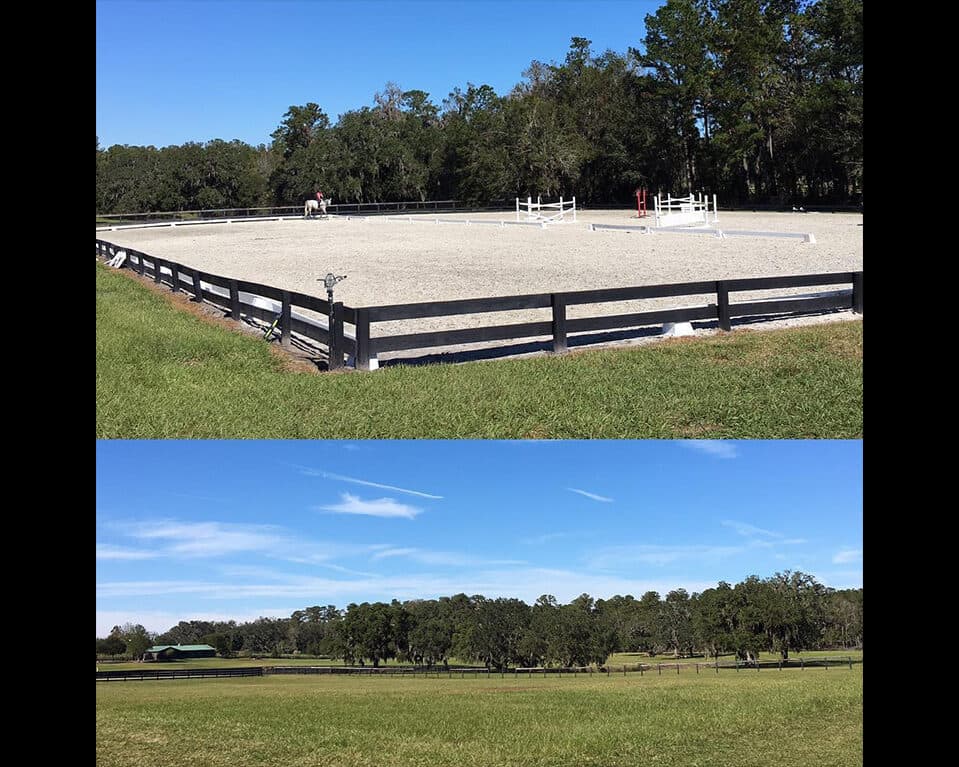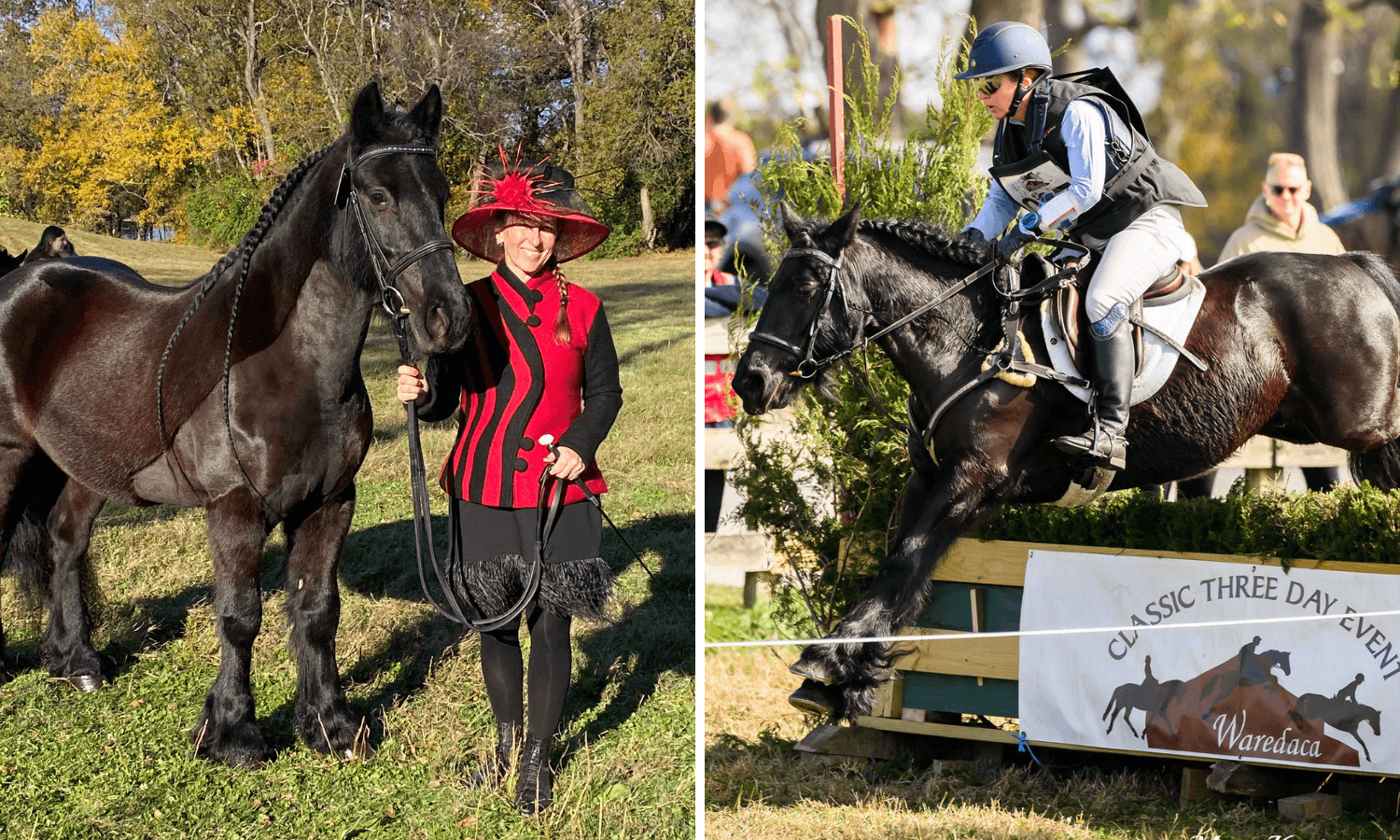Wintering In Florida with John Michael and Kimmy Durr

In this series, the United States Eventing Association (USEA) is partnering with Athletux to bring you business tips from top eventing riders and coaches. Do you have a business question you’d like to see addressed by an eventing professional? Email us at [email protected].
As I write this article my weather app lists the current temperature at 5 degrees Fahrenheit. My Facebook newsfeed is inundated with photos of horses munching on their bran mash and tucked into the heaviest blankets their owners have on hand. Snow and ice have schools shutdown, and riding without an indoor, preferably a heated one? Probably not going to happen.
In contrast, the high in Ocala, Florida tomorrow will be almost 70 degrees, and from what I’m told, that’s kind of chilly for this time of year. So it’s really no wonder many eventers and equestrians of all stripes are fleeing the frozen tundra of their home states for sunny Florida. If you’re getting ready to head south this year, or are considering a migration for 2019, you probably have lots of questions. We posed a few to John Michael Durr of Durr Eventing. During the warmer months, JM operates Durr Eventing with his wife Kimmy Durr near Tryon, N.C. This year they decided to make the trek to Ocala, and JM was happy to share some of his views on the pros and cons of relocating for the winter.
“For us, it just made the most sense for our program. We have a lot of sales horses, and we wanted to be able to do more with those horses than we were able to last year.” JM said. “You have to look at your program and your goals for the winter and make the call. If you have lots of horses that are successful and could benefit from some time off, or have a huge breeding or lesson program that would suffer with you gone, it might not be as beneficial.”
The financial implications of taking your entire program can also lead you to make some difficult decisions. “In order for us to make the numbers really work, we completely shut down the farm at home. We left after the Young Horse Show in November and we’ll be here until Easter. So it made sense to completely shut it down, turn off the water and move everyone here. If you’re not going for as long or if you have some horses that need some time off it might not make sense to do it. Sit down with a calculator and calendar and really put the pen to paper, make sure whatever you plan is that it's in the businesse's best interest.” JM recommends thinking outside the box during this process. If your lesson program is a profit driver, think about hiring a substitute to keep you kids going and bring in some income while you’re away. If you have some young horses that could use some pasture time see if a friend or boarding facility you trust could take them on while you’re away.
“Even though we brought all of our horses and they’ll all be in consistent work through the winter, I’m always acutely aware that horses need breaks. They need some downtime both mentally in physically at some point in the year. We were able to shift their vacations so we can take advantage of the opportunities being in Ocala affords us. If you’re bringing competition horses to Florida or Aiken over the winter, try and find a time later in the year where they can get that downtime.” JM advises, adding that the hottest months of the year are great options for some rest for both horses and riders.
So it’s decided! You’re heading to Ocala or Aiken, now all that’s left to do is pack the trailer. Any tips for that super fun checklist item? “Bring more than you think you’ll use. Since we closed down the farm we were able to really pack it all up, which I recommend. There’s also lots of things you can pack that can lead to decreased costs while you’re in Florida. We brought as much hay as we possibly could, it’s simply more affordable that way. If you can do that, I recommend it.” JM said. Of course, there is some incredible shopping in Ocala, but it’s always better to be prepared and NOT have to buy a pair of side reins when your perfectly functional pair are sitting in the tack room (potentially frozen) hours and hours away. Make like Santa and check that list twice, that way you’ll be able to spend your money on fun stuff that you might not be able to find as easily back home.
Once you’re packed and on your way you might find yourself with eyes wide checking out the events available for your program. Back home there might not be anything on the calendar, but it’s non-stop down south. “Take advantage of everything you can. There are phenomenal trainers to ride with, clinics to audit, and shows to attend. We decided to come down because it keeps our horses in a much more consistent program. Just like we would be able to do in Tryon, we’re able to spend the week at a jumper show, exposing sales horses or introducing young ones to their future lifestyle, and then on the weekend we’ve got an event to attend. There’s so much we’re able to do with the horses it really makes life easier. Use the opportunity and warm weather to start your year off as strong as possible.” JM added.
Regardless of if you head south for winter, or if you stay home and break out the heavy weight blankets, winter is a time to focus on your businesses goals for the year. If heading south fits your game plan, now you’re more prepared than ever. Good luck, learn lots, and don’t forget your helmet visor!
John Michael Durr and his wife Kimmy Durr own and operate Durr Eventing out of Shelby, N.C. as well as Ocala, Fl. during the winter. To learn more about their winter routine and check out some great photos of the Florida sunshine (it might help warm you up if your thermostat is registering single digits) check out their Facebook page and website.















